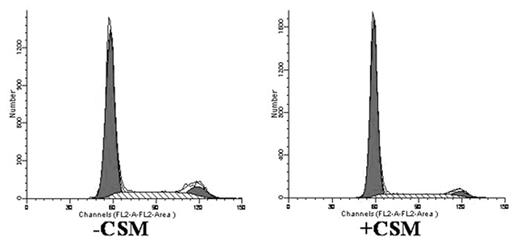Abstract
Mesenchymal stem cells (MSC) are multilineage non hematopoietic progenitor cells that play a key role in supporting the lymphohematopoietic system. Their distribution in bone marrow and secondary lymphoid organs allows an intimate interaction with T and B-lymphocytes, which contribute to the normal lymph node development, but this interaction, can not be considered as a simple bi-directional cross-talk and other cell subsets, such as dendritic cells (DC), must be considered. We have analysed the effect of MSC on B-lymphocytes and the pathways involved in these effects. For these propose, we cultured B-cell with or without MSC and analysed different markers involved in the differentiation of B-cells. We found that MSC inhibited proliferation, arresting B lymphocytes in G0G1 phase of cell cycle (figure 1). However, the presence of MSC increased the viability ob B-lymphocytes (double number of viable B-cells: from 13012 to 22835 Annexin-V PE/7 ADD negative events within B-lymphocytes in absence versus presence of MSC). The exposure of B-cells to plasmocytoid DC (pDC) induced B-lymphocytes differentiation increasing both the percentage of CD38++/CD138++ cells as well as the mean fluorescence intensity of both markers (figure 2). Accordingly, different B-cell subpopulations could be identified which represented a continuum in B-cell maturation. While the levels of cytoplasmic immunoglobulin (cIg) were higher among CD38++ cells, the opposite occurred for the expression of surface Ig as well as CD19 and CCR7. Interestingly, the presence of MSC blocked B-cell differentiation. Regarding the pathways involved in these effects, the presence of MSC influenced on ERK 1/2 and p38 pathways, but these effects depended on the culture conditions. Thus, MSC induced phosphorilation of ERK 1/2 MAPK and inhibited phosphorilation of p38 in B-cells cultured with Ig plus CpG (low proliferative conditions) while the contrary occurred in B-cells cultured with TPA (highly proliferative conditions). Therefore we demonstrated that MSC increased viability and blocked cell cycle of B-lymphocytes. Furthermore the plasmocitoid dendritic cells favoured B-lymphocytes differentiation and this process in inhibited in presence with MSC. These effects are at least in part mediated through the ERK 1/2 and p38 pahtways.
Author notes
Disclosure: No relevant conflicts of interest to declare.



This feature is available to Subscribers Only
Sign In or Create an Account Close Modal